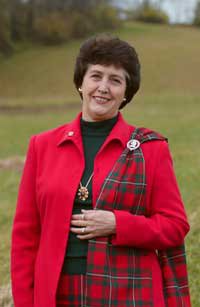
Grace Toney Edwards
Grace Toney Edwards is director of the Appalachian Regional Studies Center at Radford University in Virginia. She lives in Christiansburg, Va. and Knoxville, Tenn. Edwards was the recipient of the 2006 Educational Service to Appalachia Award and was senior editor of “A Handbook to Appalachia” (2006).
Grace Toney Edwards is director of the Appalachian Regional Studies Center at Radford University in Virginia. She lives in Christiansburg, Va. and Knoxville, Tenn. Edwards was the recipient of the 2006 Educational Service to Appalachia Award and was senior editor of “A Handbook to Appalachia” (2006).
Testimony. I felt called to testify last night to my graduate students. My topic: “The Richness of an Academic’s Life, or What I Did Last Week.”
I had just emerged from a spate of activities that ranged from workshops with eager undergraduates preparing to mentor high school students in southwest Virginia, to a workshop with excited, enthusiastic teachers, to a history lesson about the Farm at Selu for Business and Professional Women, to a three-day feast of Appalachian literature at Emory and Henry College’s 25th annual Literary Festival. Near collapse at the end of it all, I pondered on the treasures that forever emerge in my chosen career.
“How could anyone even consider doing anything else?” I asked my students.
How I got here. To explain the journey, I offer a bit of context. From earliest memory, I heard stories and songs in my western North Carolina home. This early exposure to valued narrative translated into a passionate love of reading, which in turn translated into a college major in English and ultimately to a Ph.D. focused on folklife, culture and literature of the region from which these first stories came – the Appalachian mountains.
An abundance. At Radford University I’ve helped build an interdisciplinary, multi-faceted program about this place I call home: From the 1981 Appalachian Studies curriculum to the 2006 dedication of the living-history Farm at Selu Conservancy. I’ve learned about related disciplines, about people in Appalachia and beyond, about myself. I’ve studied, taught, published and presented in numerous venues. I’ve cultivated a passion for tracing Appalachian-Scottish-Irish links, which frequently takes me in search of ancestral tartans, tales and tunes to bring home to the classroom.
My hope. It rests in the youth in our classrooms who must sustain our mountains and our communities in the future. In our outreach program called AASIS (Appalachian Arts and Studies in the Schools), we send dedicated RU students into high schools of southwest Virginia to encourage “college-able but not necessarily college-bound” youngsters to consider higher education and at the same time to value their own place and culture. Over a 10-year history, we have tracked a college-attendance success rate of 60 percent among these students – up from zero percent before AASIS. Even better, most are going back home to live and work, to manage resources, to run local government, to become entrepreneurs, to build pride in their own mountain region and culture.
Young voices. In a presentation at the national Appalachian Studies Association Conference in Dayton, Ohio, a group of five RU undergraduates spoke eloquently about their passion for the AASIS program and the Appalachian Teaching Project sponsored by the Appalachian Regional Commission, a collaborative effort among the students of a dozen regional educational institutions to examine cultural assets on which to build sustainability for Appalachian communities. Our students share my belief that education – that is, an informed and engaged citizenry – is the answer to Appalachia’s future.
They affirmed their own worth, their own hope, and mine, when they said, “We know that a kid in Rural Retreat, Va., is thinking about college because we’ve been there. We know somebody at ARC is hearing us in Washington because we’ve been there. We know we are making a difference.”
For me, the teacher, scholar and advocate, that is the only story I need to hear – the story of youth’s confidence, the story of youth’s leadership in working to sustain our communities and our mountains. It is the story of Appalachia’s future.

